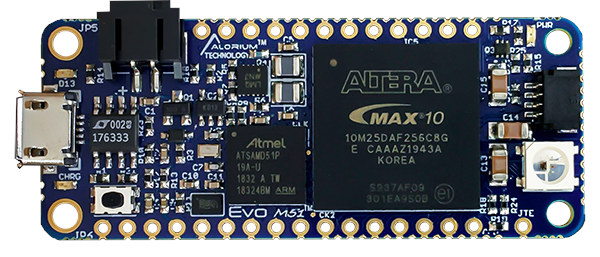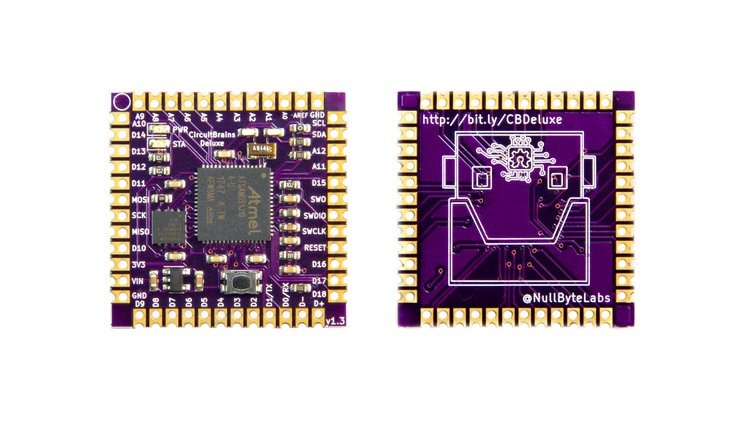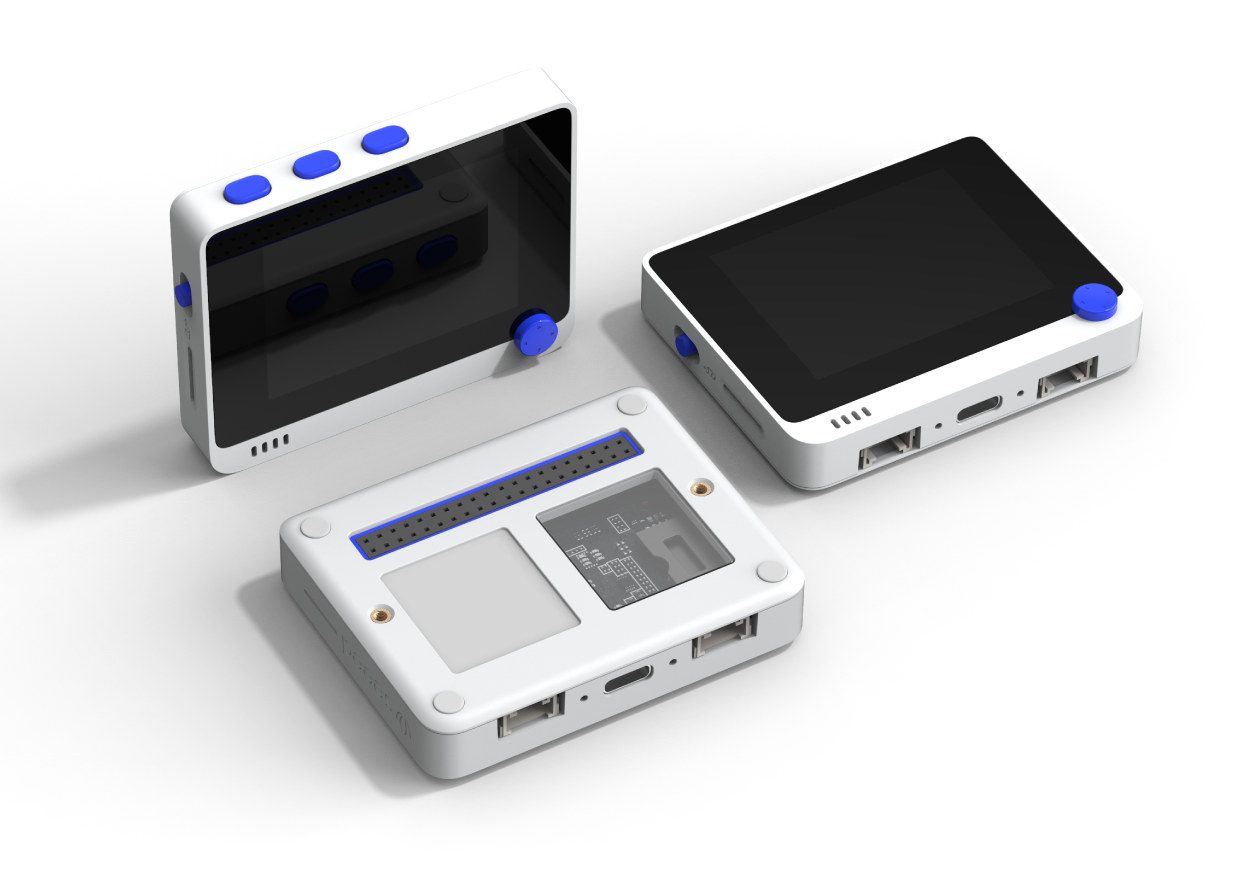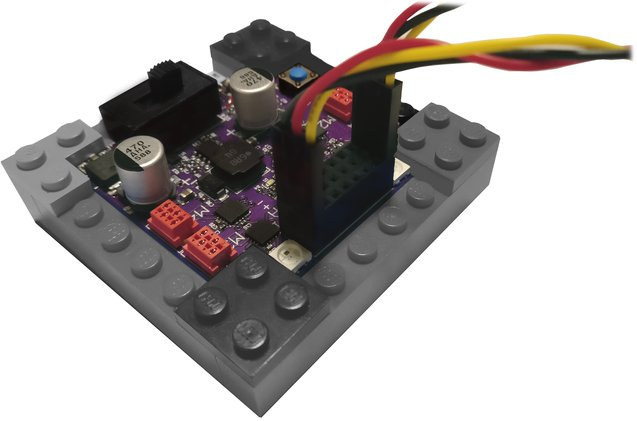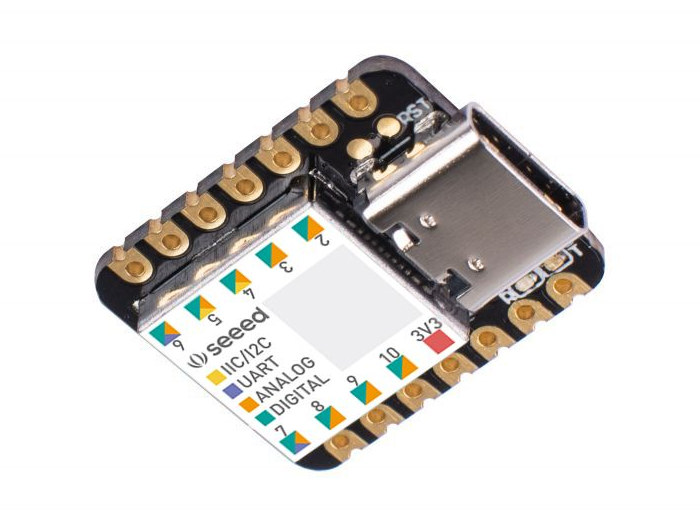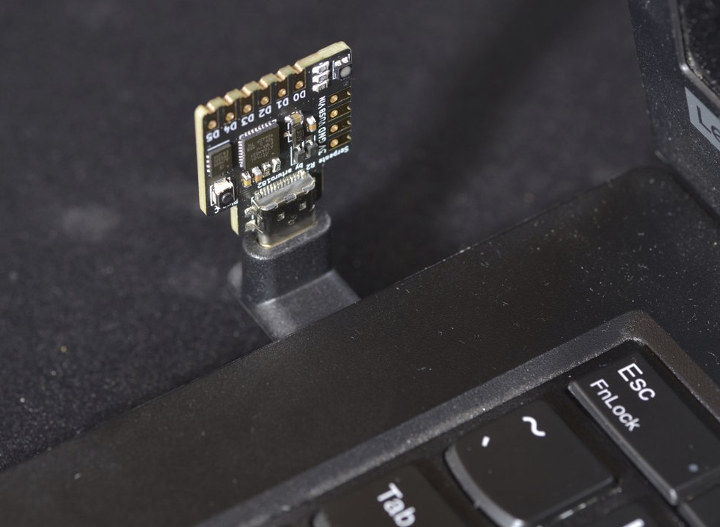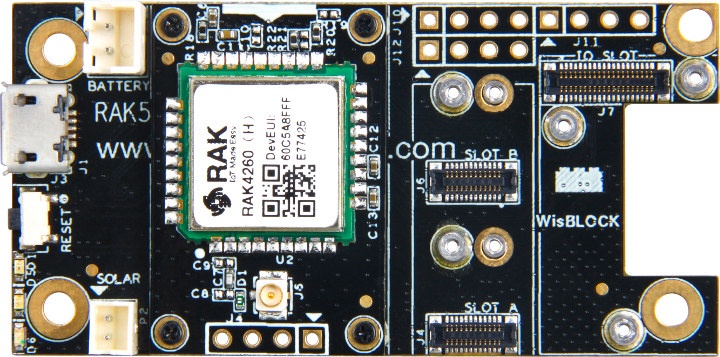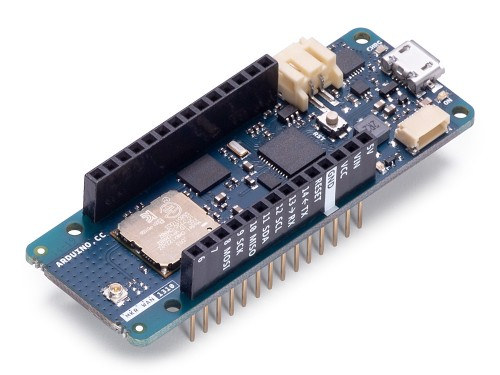Arduino unveiled its first FPGA board around two years ago with MKR Vidor 4000 combining an Intel Cyclone FPGA with Microchip SAMD21 Cortex-M0+ MCU in a form factor similar to Arduino Zero. But in case you are looking for an even smaller Arduino compatible FPGA board, Alorium Technology’s Evo M51 might be exactly what you are after. The Adafruit Feather-sized board is equipped with an Atmel SAMD51 Arm Cortex-M4F microcontroller coupled with an Intel MAX 10 FPGA. Evo M51 specifications: MCU – Microchip (Atmel) SAMD51 Arm Cortex-M4F microcontroller clocked at 120 MHz with 512KB flash, 192 KB SRAM FPGA – Intel MAX 10 (10M25) FPGA with 25K LEs, 675Kbit block memory Storage – 2MB external flash USB – 1x micro USB port for power and programming I/O Digital 55x Total Digital I/O – 21x through-hole/castellated vias, 34x additional castellated-only 6x digital pins shared with analog pins 3.3V Inputs, 3.3V Outputs […]
CircuitBrains Deluxe is a Tiny, CircuitPython-compatible Module (Crowdfunding)
There are plenty of boards with Adafruit’s CircuitPython support, but Microchip SAMD51 powered CircuitBrains Deluxe is a little different since it’s a module with castellated holes that make it easy to solder to your own baseboard or integrate into a space-constrained product. CircuitBrains Deluxe specifications: MCU – Microchip/Atmel ATSAMD51J19 32-bit ARM Cortex M4 microcontroller @ 120 MHz with 192 KB SRAM, 512 KB Flash Storage – 8 MB Quad SPI Flash I/Os via 48x through holes and castellated holes around the module GPIO (13 Analog, 2 of which are DAC capable, and 19 Digital) SPI, I²C, UART SWD programming/debug interface USB D- & D+ Power Supply Voltage – 5V Output – Onboard 3.3 V 600 mA Linear Regulator (LDO) connected to 3V3 pin Dimensions – 29 x 29 x 3.5 mm The module comes preloaded with CircuitPython, a fork of MicroPython maintain by Adafruit. You can just connect the board […]
Wio Terminal Features Microchip SAMD51 MCU, Dual-Band WiFI & Bluetooth WiFI, and 2.4″ LCD
Microchip SAM D5x Arm Cortex-M4 microcontrollers were introduced in 2017, and the next year we started to see Arduino or MicroPython compatible board brought to market including Adafruit Metro M4 or Tachyon boards. Seeed Studio has now introduced its own Arduino & MicroPython compatible SAMD51 platform with Wio Terminal also integrating an RTL8720DN dual-band WiFi 4 and Bluetooth 5.0 chip, and 2.4″ LCD display. There are also Grove connectors to add sensor modules, and a 40-pin header to use the device like a Raspberry Pi HAT. Wio Terminal features and specifications: MCU – Microchip SAMD51 (ATSAMD51P19) Arm Cortex-M4F microcontroller @ 120 MHz (can be overclocked to 200 MHz) with 192KB RAM, 512KB flash Storage – 4MB external SPI flash, MicroSD card slot up to 16GB Display – 2.4″ LCD screen with 320×240 resolution (ILI9341 driver) Audio – Microphone and buzzer Connectivity – Dual-band WiFi 4 802.11b/g/n and Bluetooth 5.0 via […]
Snekboard Controls LEGO Power Functions with CircuitPython or Snek Programming Languages (Crowdfunding)
LEGO has provided robotics kit for years, and LEGO blocks and accessories in general are great to build all sort of projects, so it’s not surprising third-parties have come up with LEGO-compatible boards and accessories for makers which include DFRobot BOSON kits, STEMTera smart breadboard, Brixo LEGO blocks with built-in electronics, and more. Snekboard is another option with the Microchip SAMD21 board designed to work with LEGO Power Functions motors and switches are programmable with MicroPyhon based CircuitPython or Snek programming languages. Snekboard hardware specifications: Microcontroller – Microchip SAMD21G18A Arm Cortex-M0 MCU with 256 KB flash and 32 KB RAM. Storage – 2MB SPI flash USB – 1x Micro USB port for power and programming Motor Control – 4x TI DRV8800 DC motor drivers tp provide up to 2.8A for LEGO motors and servos I/O- 8x GPIOs (3.3V) Misc – 2x RGB LEDs, 1x blue LED Power Supply 5V via […]
Seeeduino XIAO is a Tiny Arduino Zero Compatible Board with Battery Support
Seeeduino XIAO is the smallest Arduino compatible board from SeeedStudio’s Seeduino family. Measuring just 23.5×17.5 mm, the board is equipped with Microchip SAMD21 Arm Cortex-M0+ microcontroller and exposes various digital and analog I/Os. Seeduino XIAO specifications: MCU – Microchip SAMD21G18 ARM Cortex-M0+ microcontroller at up to 48MHz with 256KB Flash,32KB SRAM USB – 1x USB type C port for power and programming Expansion I/Os 2x 7-pin headers with 11x analog inputs, 11x digital I/Os, 1x DAC, SPI, UART, and I2C 3.3V I/O voltage (not 5V tolerant) Misc – 1x user LED, power LED, 2x LEDs for serial port downloading, Reset pads, SWD pads, 32.768KHz crystal oscillator Power Supply – 5V via USB-C power, power pads (VIN/GND) for battery Dimensions – 23.5×17.5×3.5 mm All main components are placed under a shield, but there may be some charger chip (nope: see comments) as the company explains the board supports batteries via the […]
Serpente R2 Microchip SAMD21 Board Features a Male USB Type-C Port
Development boards with a USB Type-C port for power and programming are becoming more common, most in most cases with a female USB-C port. Designed by arturo182, Serpente R2 CircuitPython prototyping board based on Microchip SAMD21 Arm Cortex-M0+ microcontroller offers three USB power & programming option with USB type-A male, USB type-C female, or USB type-C male, with the latter option allowing you to plug into directly into your host computer. Serpente R2 board specifications: MCU – Microchip ATSAMD21E18A 32-bit Cortex-M0+ running at 48MHz, with 256KB flash, and 32KB RAM Storage – 4MB SPI Flash for storing files and CircuitPython code Expansion – 10x I/Os with castellated holes including 6x customizable GPIOs, and 4x power signals (3V, GND, VUSB, and VIN) USB R2 – Female USB Type-C port R2 Plug – Male USB Type-A port R2 Plug C – Male USB Type-C port Misc – User RGB LED, reset button […]
RAKWireless RAK4260 is a Tiny LoRAWAN Module based on Microchip SAMR34 LoRa SiP
Rakwireless has just announced a new module part of their LPWAN family: RAK4260 LoRaWAN module based on Microchip ATSAMR34J18B LoRa SiP and at just 15x15x1.2 mm, one of the smallest LoRaWAN modules in the market. The new module is cheaper than the company’s earlier RAK811 module and consumes less power at just 790 nA in sleep mode. The company also provides a RAK4260 evaluation board with easy access to GPIOs and serial interfaces. RAK4260 LoRaWAN Module Specifications: SiP – Microchip ATSAMR34J18 SiP with SAM L21 Arm Cortex M0+ MCU @ 48 MHz, up to 40 KB RAM, up to 256 KB Flash LoRa Connectivity Frequency Range – 862 to 1020 MHz High level of accuracy and stability (32MHz TXCO) Max Tx Power: 20dBm; Max Sensitivity: -148dBm; Rx Current: 17mA (typical) Compliant with LoRaWan 1.0.2 Expansion – Castellated holes with I2C, SPI, ADC, UART, GPIOs Power Consumption Low RX current of […]
Arduino MKR WAN 1310 LoRa Board Gets HW Security, Longer Battery Life and a 2MB SPI flash
Two year ago Arduino launched MKR WAN 1300 board powered by Arduino Zero compatible Microchip Atmel SAMD21 32-bit ARM Cortex M0+ MCU and a Murata CMWZ1ZZABZ LoRa module based on Semtech SX1276 and STMicro STM32L microcontroller. The company has now announced a new improved LoRa board – MKR WAN 1310 – with lower power consumption thanks to a new battery charger , a 2MB SPI flash which enables data logging and other OTA (Over-the-Air) functions, and a crypto chip that can securely store credentials and certificates. Specifications: MCU – Microchip Atmel SAMD21 32-bit ARM Cortex M0+ MCU @ 48 MHz with 32 KB SRAM, 256 KB flash (8KB for bootloader) External Storage – 2MB SPI flash Digital I/O Pins – 8x digital I/Os, 12x PWM, UART, SPI, and I2C, 8x external interrupts Analog Pins – 7x analog inputs (8/10/12-bit ADC), and 1x analog output (10-bit DAC) DC Current per I/O […]


